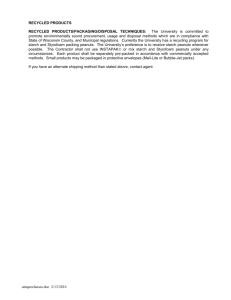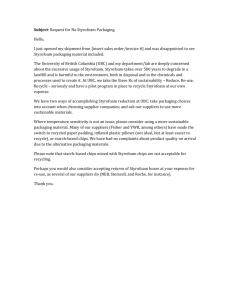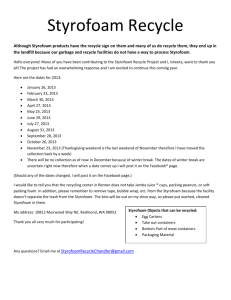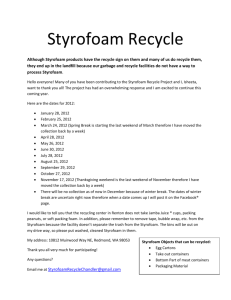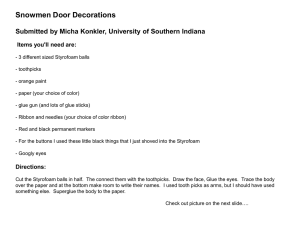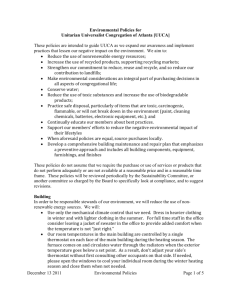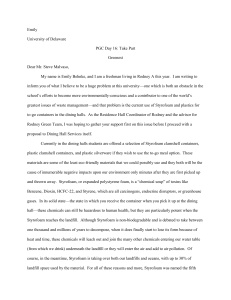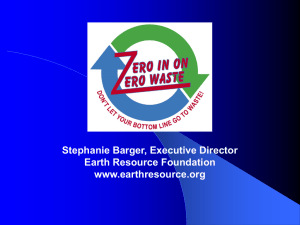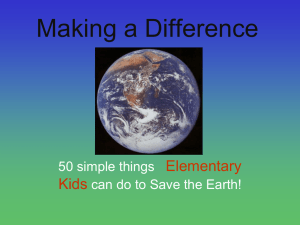Comments on Waste Reduction - Florida Department of Environmental
advertisement
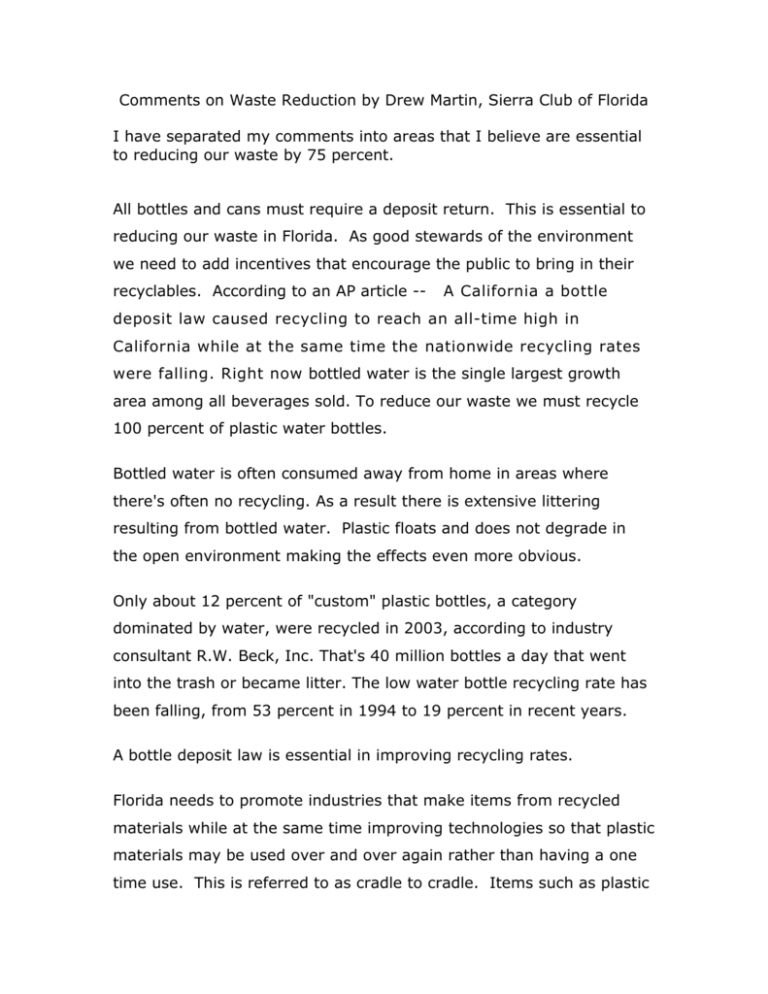
Comments on Waste Reduction by Drew Martin, Sierra Club of Florida I have separated my comments into areas that I believe are essential to reducing our waste by 75 percent. All bottles and cans must require a deposit return. This is essential to reducing our waste in Florida. As good stewards of the environment we need to add incentives that encourage the public to bring in their recyclables. According to an AP article -- A California a bottle deposit law caused recycling to reach an all-time high in California while at the same time the nationwide recycling rates were falling. Right now bottled water is the single largest growth area among all beverages sold. To reduce our waste we must recycle 100 percent of plastic water bottles. Bottled water is often consumed away from home in areas where there's often no recycling. As a result there is extensive littering resulting from bottled water. Plastic floats and does not degrade in the open environment making the effects even more obvious. Only about 12 percent of "custom" plastic bottles, a category dominated by water, were recycled in 2003, according to industry consultant R.W. Beck, Inc. That's 40 million bottles a day that went into the trash or became litter. The low water bottle recycling rate has been falling, from 53 percent in 1994 to 19 percent in recent years. A bottle deposit law is essential in improving recycling rates. Florida needs to promote industries that make items from recycled materials while at the same time improving technologies so that plastic materials may be used over and over again rather than having a one time use. This is referred to as cradle to cradle. Items such as plastic bags should be made from recycled bags not from new oil. Right now the world consumes 10 million barrels of oil a year manufacturing plastic bags that have a useful life of only twenty minutes, but a life in a land fill of over 1000 years and in our oceans may remain permanently part of the environment. Another product of fossil fuels that Florida should recycle 100 percent of is Styrofoam. Styrofoam is also known as expanded polystyrene (EPS) foam used in plastic #6 (polystyrene) in plastic cups and CD and DVD cases. Many food vendors provide Styrofoam containers for take out and it is ubiquitous everywhere. The state needs to include Styrofoam as an item to be reduced and or recycled. I recommend that Florida place a fee on Styrofoam containers thus discouraging its uses. Take out containers could be made from other materials. Styrofoam is form of litter and appears to remain in the environment. Florida should work with manufactures and food vendors to reduce the significant amount of Styrofoam being used. Styrofoam is also prevalent in food packaging. Some corporations such as Publics do take back Styrofoam, but the question is how much is actually being recycled. Styrofoam can be recycled and The Alliance of Foam Packaging Recyclers reported that 56 million pounds of EPS was recycled in one year. The state needs to work closely with private businesses to assure drop off sites are available around the state and to see if our waste facilities could adopt programs for voluntary recycle Styrofoam. Because it’s so lightweight, EPS takes up 0.01 percent of the total municipal solid waste stream by weight, but its volume and indestructibility is an issue. It takes up space in landfills and doesn’t biodegrade. Further, it is not good to burn Styrofoam and I would oppose including this in any waste to energy program. Biodegradable packing material is an alternative. Some biodegradable products are plant-based and break down into inert proteins that naturally degrade after coming in contact with water and are consumed by soil bacteria. These products could be composted in home gardens or in composting on a larger scale. I recommend that the state adopt a policy to reduce Styrofoam both in packaging and in the use of disposable containers from food vendors. Other more environmentally friendly products should be encouraged. Packaging of products generates a great deal of waste. The state needs to promote the reduction of packaging in the sale of all products. Packaging is one of the greatest forms of waste in land fills and adds weight during shipping causing increased use of energy. Another significant area of waste are discarded electronic devices and accompanying batteries and other materials. The Environmental Protection Agency has not done enough to curb the export of discarded electronic products. A 63-page report -commissioned by House Foreign Affairs Committee Chairman Howard L. Berman (D-Calif.) -- is a scathing critique of the EPA's failure to control the export of used electronic equipment, which often is sent to China, India and other countries to be dismantled under unsafe conditions. U.S. authorities have yet to develop a national approach for handling the waste, which often contains toxic metals such as lead, mercury and cadmium. Amounts are rapidly growing as consumers replace their laptops, cell phones and televisions. Florida needs to lead the way by insisting that manufactures and retailers of these products find a way to capture these products safely at the end of their useful life. The state of Florida needs to adopt a policy on the sale and collection of e-waste. A fee at the time of the sale of items might improve the collection of e-waste at the end of its useful life. It appears that currently much of this waste is currently going directly into land fills. This waste should never be burned or left to decompose in land fills. Pharmaceuticals and other compounds also need special handling to avoid entering the waste stream and escaping into our water resources. Right now these products when excess are either being flushed down toilets or tossed into the garbage. Pharmaceutical manufacturers need to adopt policies to recover this waste. In particular unused pharmaceuticals could be returned to the manufacturer for safe disposal or to be recombined into new products when possible. It is extremely important the manufacturers of the products take responsibility for their disposal. Many hospitals and nursing homes currently dispose of these products down the toilet or into the trash. Because our water table is so close to the surface and mixes with the ocean we need to take action deal with the disposal of these products. Some of the chemicals found in pharmaceuticals that have been found in nearby water sources are: Carbamazepine, an anti-convulsant and mood stabilizer, Cotinine, a nicotine metabolite, DEET, an insect repellent, Galaxolide, a synthetic musk, Monensin, a cattle antibiotic and Naproxen, an anti-inflammatory. All unused household pesticides should also be accepted back by manufacturers or retailers and never placed into our waste system. All manufacturers of products need to provide drop off points for recovery of these products. All such products need to be labeled to recommend that they be returned to manufacturer rather than placed into the waste stream. Further, disposal fees need to be included in the purchase price of products so that the cost of disposal is already covered thus providing an incentive to correctly dispose of the product at the end of its life. In order to reach a goal of 75 percent waste reduction it is essential that all counties and cities have mandatory recycling programs. All business must be required to recycle card board and paper, in particular. Too many businesses in Florida still do not recycle their waste leading to excess land fill needs. Thank you for taking the time to listen to these recommendations.
